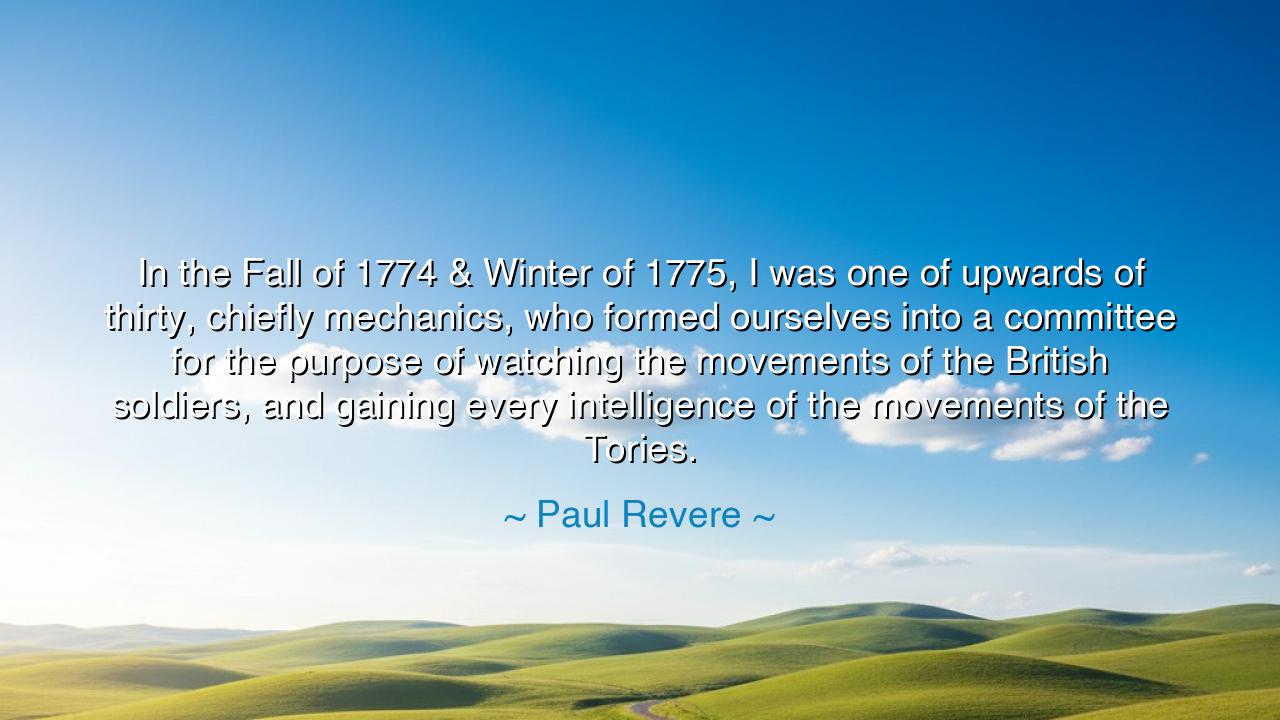
In the Fall of 1774 & Winter of 1775, I was one of upwards of
In the Fall of 1774 & Winter of 1775, I was one of upwards of thirty, chiefly mechanics, who formed ourselves into a committee for the purpose of watching the movements of the British soldiers, and gaining every intelligence of the movements of the Tories.






In the steadfast and immortal words of Paul Revere, the patriot and messenger of liberty, we find a window into the heartbeat of revolution: “In the Fall of 1774 & Winter of 1775, I was one of upwards of thirty, chiefly mechanics, who formed ourselves into a committee for the purpose of watching the movements of the British soldiers, and gaining every intelligence of the movements of the Tories.” These words, simple yet filled with quiet fire, carry the spirit of a people awakening to the call of freedom. They remind us that great revolutions do not begin with kings or scholars, but with ordinary men and women, united by purpose, courage, and faith in something greater than themselves.
The origin of this quote lies in the months before the storm of war broke upon the colonies. The British crown, fearful of rebellion, had stationed soldiers in Boston to enforce its will. But beneath the surface, resistance was stirring — not in the halls of Parliament, but in the workshops, taverns, and meeting houses of common people. It was here that Revere and his companions, “chiefly mechanics,” gathered to form what history would call the “mechanics’ committee of safety.” They were blacksmiths, carpenters, and silversmiths — men of labor, not leisure — yet they became the eyes and ears of a revolution still unborn. From their vigilance came the knowledge that would one day light the lanterns in the Old North Church and send Revere riding through the night to warn, “The British are coming.”
In this humble act of organization, Revere reveals a truth that echoes through all ages: freedom begins not with grand speeches, but with quiet preparation. While others debated the legality of rebellion, these thirty men acted. They gathered intelligence, observed movements, and laid the groundwork for resistance. Their courage was not in the battlefield, but in the unseen labor of watchfulness — in choosing to stand for liberty before it was safe, before it was popular, before the outcome was known. This is the essence of patriotic duty: to act not for glory, but for conscience.
Revere’s quote reminds us, too, of the power of the common man. He does not name generals or noblemen, but “mechanics.” These were artisans and workers, men whose hands were hardened by toil, yet whose minds burned with conviction. In them lived the soul of a new nation — a nation founded not upon class or privilege, but upon the courage of individuals who believed that liberty was worth the risk of everything. Their story teaches that greatness is not bestowed; it is earned through devotion to a cause higher than self.
Consider how their spirit has lived on through the centuries. When the world trembled under tyranny in later ages — when ordinary people in distant lands rose to defend freedom, to speak truth, to resist oppression — it was this same spirit that stirred within them. The mechanics of Boston were the ancestors, in spirit, of all who dare to say, “We will not be silent.” Just as Paul Revere and his band stood watch in secret against the empire that sought to silence them, so too do modern defenders of liberty keep watch — journalists, activists, and citizens who seek truth in an age of deception. The torch Revere lit has not gone out; it burns wherever vigilance and courage dwell.
Yet Revere’s words carry also a warning. He speaks of watching and gaining intelligence — not for conquest, but for awareness. Freedom requires not only bravery, but constant vigilance. Tyranny does not always arrive with the roar of armies; sometimes it comes quietly, cloaked in comfort and indifference. The lesson of Revere’s committee is that liberty must be guarded before it is lost, and that every generation must become its own watchman. To sleep in peace without watchfulness is to invite the return of chains.
Therefore, O listener of this age, take this teaching to heart: be a mechanic of your own time. Do not wait for others to defend what is sacred. Stand watch over truth, over justice, over the quiet rights that hold society together. Like Revere and his companions, act in the shadows if you must, but act with integrity and purpose. Let your vigilance be the safeguard of your freedom, your courage the shield of your children’s tomorrow. For in the end, the greatness of a people lies not in the power of their rulers, but in the resolve of their citizens to remain forever awake.
Thus, as the echo of Revere’s hoofbeats fades into history, his words remain a call across the ages — a reminder that liberty is not given, but guarded; not inherited, but renewed. Stand, therefore, for what is right, even in the quiet hours before dawn. For when the storm breaks, it will be the prepared — the watchful, the steadfast, the true — who light the lanterns of freedom once more.






AAdministratorAdministrator
Welcome, honored guests. Please leave a comment, we will respond soon